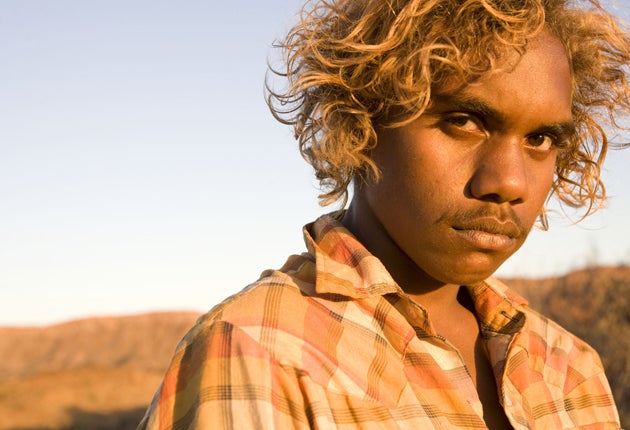Samson & Delilah, Warwick Thornton, 101 mins, (15)
A story of adolescent angst in an Aboriginal community needs few words to make its point

Despite its title, Australian film Samson & Delilah is not a biblical epic – although haircuts do come into it. Nevertheless, Warwick Thornton's debut feature is a somewhat timeless thing – not just the age-old story of boy meets girl (boy acts like dope, girl nevertheless is resilient enough to stick by him), but also the perennial tale of small-town boredom, rebellion and escape.
The film's young lovers live in a small Aboriginal shanty community in the central Australian desert – a few breezeblock houses, a shop where the sign "Store Closed Sunday" could easily mean every other day of the week, one payphone in its steel mesh cage, ringing unanswered. Teenager Samson (Rowan McNamara) wakes to the sound of country music radio, rouses himself with a blast of petrol fumes, then wanders out to the porch where his brother's three-piece band is for ever pounding out the same piece of lumbering ska that's their one song.
Meanwhile, Delilah (Marissa Gibson) lives with her aged grandmother (Mitjili Gibson), helping her to paint the traditional artworks that get sold in a city gallery – for exorbitant prices, we later learn, while Nana receives a pittance. Delilah is aware of Samson cheerfully mooning around her, but seems unlikely to give him more than a passing scowl. Occasionally he'll toss a playful rock at her; once she offhandedly gives him some goodies from the store, then slings a rock at him too. This is teenage courtship as it ever was.
Eventually, boredom and the band's endlessly repeated bassline push Samson into a furious burst of petulance – after which he picks up his mattress and installs himself in Delilah's yard. Later, the young couple leave town under a cloud, and end up living rough under a bridge in Alice Springs, adopted by Gonzo (Scott Thornton), a homeless, half-crazy alcoholic who serenades them with hymns in his cracked voice.
By turns witty, moving and quietly painful, Samson & Delilah is a great example of cinema's ability to cast off its dependency on the spoken word. The film has dialogue in English and the Aboriginal tongue of Warlpiri, but it features precious little speech either way. The seemingly mute Samson only ever utters one word, his own name, and the young couple never address each other.
But what talk doesn't do, sound does. Thornton's own score ranges from a scraping violin lament to the eerie thudding and booming under Gonzo's bridge. The words come mainly in songs – Samson's country-and-western radio and the Mexican ballad in which Delilah takes refuge. The two teenagers' musical worlds come together in a wonderfully economical scene, with the Mexican song in the background: from the back of a Jeep, Delilah gazes at Samson dancing frenziedly to a rock number, and without a word spoken, with the barest flicker of an expression on her face, we know that's when she falls for him.
But there's nothing soft-hearted about this romance. The film's bottom line is that Aboriginals get an extremely raw deal, and even having rebel spirits like this young duo doesn't always help. Taking her own painting into the fancy "Native Affairs" gallery, Delilah gets only a contemptuous shake of the head from its owner. White Australians come off badly: diners in a restaurant scrupulously ignore Delilah and her painting until she returns, half-crazed with despair, thrusting a more angrily daubed canvas in their faces.
Aboriginal director Thornton has made a film that's both tender and angry, quietly but compellingly raging at the abandonment and exploitation of his people, and at the way that so much Aboriginal youth has damaged itself with petrol sniffing. Once Samson leaves home, he's effectively out for the count, lost in the bottom of his plastic bottle and oblivious to two shocking events that befall Delilah while she's out of his eyeshot – both moments filmed, with devastating effect, as something happening just behind the boy yet seemingly a million miles away.
The personal, hands-on feel of Thornton's film also derives from the fact that he has shot it himself in 35mm, often beautifully but always sparely, occasionally tempering the realism with simple poetic effects: a whole night passes for the stupefied Samson in one brief shot. Another very personal touch is that the director casts his brother Scott Thornton as the rambling Gonzo; by all accounts essentially pretty much playing himself, Thornton's raucously indomitable street prophet makes a spiky counterpoint to the tenderly communicative silence of the winning lead duo McNamara and Gibson.

Watch Apple TV+ free for 7 day
New subscribers only. £9.99/mo. after free trial. Plan auto-renews until cancelled.
ADVERTISEMENT. If you sign up to this service we will earn commission. This revenue helps to fund journalism across The Independent.

Watch Apple TV+ free for 7 day
New subscribers only. £9.99/mo. after free trial. Plan auto-renews until cancelled.
ADVERTISEMENT. If you sign up to this service we will earn commission. This revenue helps to fund journalism across The Independent.
Next Week:
Jonathan Romney samples melodrama alla milanese in I Am Love, an Italian dynastic drama starring Tilda Swinton
Join our commenting forum
Join thought-provoking conversations, follow other Independent readers and see their replies
Comments
Bookmark popover
Removed from bookmarks